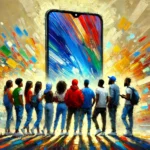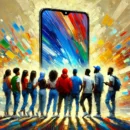Consumers, not corporates, are now driving tech innovation
“The rise of tablets and smartphones also reflects a big shift in the world of technology itself. For years many of the most exciting advances in personal computing have come from the armed forces, large research centres or big businesses that focused mainly on corporate customers. Sometimes these breakthroughs found their way to consumers after being modified for mass consumption…
Over the past ten years or so, however, the consumer market has become a hotbed of innovation in its own right. “The polarity has reversed in the technology industry,” claims Marc Andreessen, a prominent Silicon Valley venture capitalist…Now, he says, many exciting developments in information technology (IT) are appearing in the hands of consumers first and only then making their way into other arenas—a trend that tech types refer to as the “consumerisation” of IT.”
The Economist (8 October 2011)
The Economist ran an engrossing survey of personal technology last month – I hope you saw it.
One of the most interesting phenomena of recent times is highlighted in the excerpt shown: the “consumerisation” of IT. Not so long ago, “consumer” was a term of abuse in the average IT director’s lexicon. Information Technology was expensive, over-engineered, procured by tender and implemented as a multi-year project. Plug-and-play was unthinkable in the workplace. A technology that was for the consumer market was ridiculed and avoided. “Serious” IT was created for the corporate market, by people like IBM, Microsoft, HP and BlackBerry. Those people understood the seriousness of IT: the need for security, privacy and robustness.
Well, last time I checked, 3 of those 4 names were in some disarray. IBM has just celebrated a successful centenary; the others are trying desperately to reinvent themselves.
Just over a year ago, pretty much every senior executive in Kenya carried a laptop and a BlackBerry phone everywhere. Now look around: most are carrying an iPad, and increasingly, an Apple iPhone or Google Android phone. Those are things that were anathema to IT managers: they are, after all, open, entertainment oriented and fun, rather than solid and serious.
So what happened? CEOs, behaving like consumers, spotted the utility of a tablet computer faster than their IT managers did. They realized that an iPad gave them mobile email, full-screen web-viewing, mobile diaries and address books, maps, digital notepads, a video viewer, and a glorious newspaper, magazine and book reader all in one. What’s not to like?
However, I still find myself advising my CEO friends on how to do much, much more with their tablets – like using proper word-processing and spreadsheet applications, running presentations, writing reports, editing shared documents, and the like. Interestingly, their IT departments are rarely able to help them, as many are still steeped in the IT world of yesteryear.
Apple, Google, Amazon, Facebook and Twitter: these are the names responsible for the new democratisation of IT. Their products were targeted squarely at the consumer, not the executive. They gained scale by producing lovely-to-behold products that just worked out of the box – Apple’s iPad has no manual, for example. You just start playing, and figure it out.
Now, those same attributes that roped in millions of ordinary consumers are being taken to corporate devices: great design, flexibility, customisation – and good old fun! Microsoft and BlackBerry are playing catch-up to revamp their consumer products – as well as liven up their corporate ones (Windows “Mango,” anyone?).
CEOs are scrambling to get acquainted with Twitter and Facebook, things they had previously dismissed as trite platforms for social trivia. They are sporting Kindles and iPads, and delighting in the many apps their devices offer.
Long may this democratisation continue. I only hope IT professionals can wake up and learn that you learn more about technology these days from looking at what ordinary consumers use.

Buy Sunny Bindra's book
UP & AHEAD
here »
Popular Posts
- What is a nation?June 30, 2024
- To be a great leader, think like a farmerJuly 21, 2024
- Don’t be surprised by surprisesJuly 14, 2024
- It takes mavericks to change the gameJuly 7, 2024
- Why we should all be activistsJune 16, 2024















